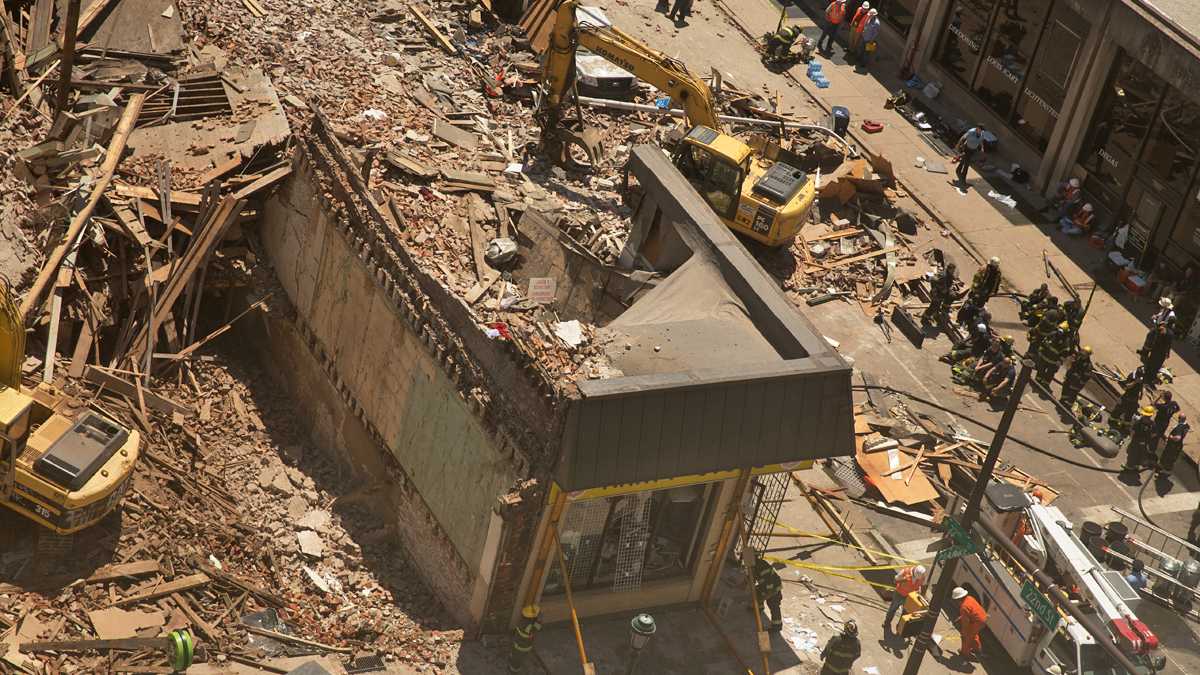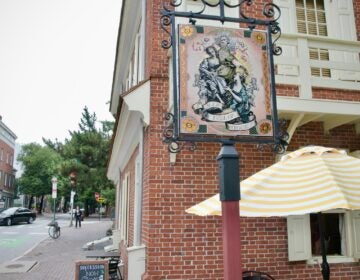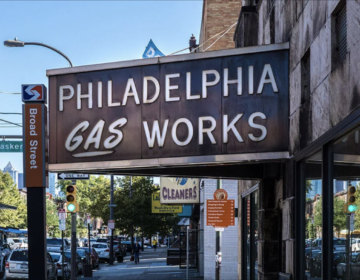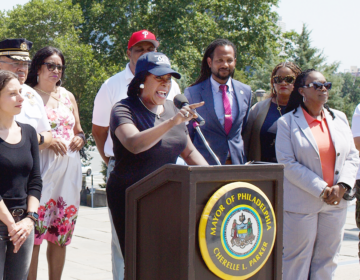Dire warnings from project manager unheeded prior to Philly building collapse
Listen
The wreckage at 22nd and Market streets in Philadelphia following the June 5, 2013, collapse. (Lindsay Lazarski/WHYY)
A former and current city official testified Tuesday that they ignored a series of “inflammatory” emails sent to Salvation Army leadership shortly before an unbraced, three-story wall of a building under demolition collapsed and crushed one of its thrift stores at 22nd and Market streets in Philadelphia.
During the first day of testimony in the civil trial stemming from the collapse following a holiday recess, former Deputy Mayor for Economic Development Alan Greenberger said he never read the emails from project manager Thomas Simmonds because he rarely checked his official email account. He said he used a different address for day-to-day correspondence.
John Mondlak, the city’s senior director of real estate development, told jurors that he read the emails, but disregarded them, mostly because of the language Simmonds used.
“They were so outrageous, I had no desire to pick up the phone and talk to him about it,” said Mondlak.
The emails were sent as Simmonds, property owner Richard Basciano’s right-hand-man, tried to gain access to the thrift store’s roof so demolition crews could safely take down the Hoagie City building next door. It was one of five commercial properties Basciano wanted to tear down to make way for a large-scale, mixed-used development along the 2100 block of Market Street.
Some of the exchanges used dire language, warning the Salvation Army of “potential danger” to the public, and that “life and limb” were on the line.
It’s unclear if Simmonds’ emails were rooted in real danger or if he was simply trying to pressure the Salvation Army into granting Basciano access to their store’s roof.
The two sides never reached an agreement.
On June 5, 2013, tragedy struck when an unsupported, three-story wall of the Hoagie City building collapsed and crushed the thrift store, killing six and injuring 13 others.
Lawyers for the Salvation Army are expected to call more witnesses Wednesday as the case moves toward the three-month mark.
The high-profile trial was initially expected to wrap up by the end of the week. Court documents now show that lawyers could continue reporting to courtroom 653 in City Hall for the next month, though Common Pleas Court Judge M. Teresa Sarmina could again extend the trial’s timeline.
The case will eventually go to a jury. The panel will decide which defendants are liable and how much money each plaintiff is owed in damages. There is no cap for the amounts.
Attorneys for the plaintiffs argue The Salvation Army, Simmonds, Basciano, owner’s representative Plato Marinakos, demolition contractor Griffin Campbell, and excavator operator Sean Benschop are among those who should pay up.
They say the decisions these man made — and didn’t make — directly led to one of the city’s deadliest days in recent history.
On the stand, several defendants have called the collapse tragic, but have stopped short of shouldering any responsibility.
“It was a terrible thing that happened … and it hurts when I knew what happened,” said Salvation Army Maj. John Cranford. “But I don’t feel that we’re responsible for what happened.”
Basciano, who was on site the day of the collapse, told jurors that Marinakos “made mistakes” and that “we wouldn’t be sitting here today” if someone better qualified had been hired to demolish his buildings.
Before being hired for the Market Street project, Campbell didn’t have a contractor’s license and had only torn down residential properties. Basciano said he didn’t know Campbell was “incompetent” until later.
Marinakos stopped by the site the night before the collapse and told Campbell that he immediately had to take the unsupported wall down before someone got hurt.
Campbell agreed, but it never happened.
Campbell and Benschop were both sentenced to prison for their roles in the collapse.
In October, a jury convicted Campbell of involuntary manslaughter and aggravated assault. He was sentenced to 15-30 years in jail.
Benschop is serving half that after pleading guilty to the same charges. On the day of the collapse, he was chipping away at the eastern wall — opposite the one that pancaked onto the Salvation Army thrift store.
Campbell and Benschop were the only two criminally charged following the collapse.
Marinakos was granted immunity for testifying before a grand jury and during Campbell’s murder trial.
WHYY is your source for fact-based, in-depth journalism and information. As a nonprofit organization, we rely on financial support from readers like you. Please give today.





